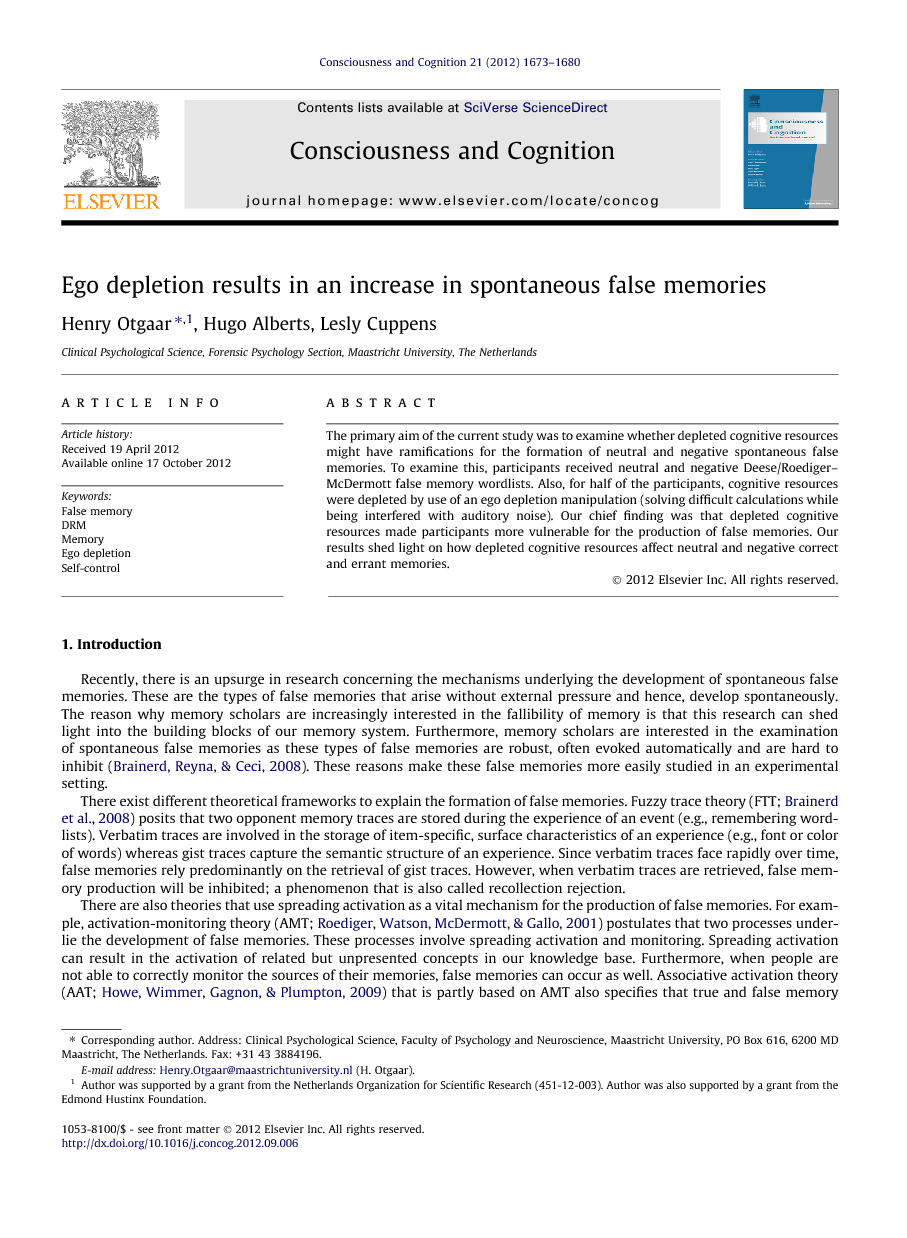The primary aim of the current study was to examine whether depleted cognitive resources might have ramifications for the formation of neutral and negative spontaneous false memories. To examine this, participants received neutral and negative Deese/Roediger–McDermott false memory wordlists. Also, for half of the participants, cognitive resources were depleted by use of an ego depletion manipulation (solving difficult calculations while being interfered with auditory noise). Our chief finding was that depleted cognitive resources made participants more vulnerable for the production of false memories. Our results shed light on how depleted cognitive resources affect neutral and negative correct and errant memories.
Recently, there is an upsurge in research concerning the mechanisms underlying the development of spontaneous false memories. These are the types of false memories that arise without external pressure and hence, develop spontaneously. The reason why memory scholars are increasingly interested in the fallibility of memory is that this research can shed light into the building blocks of our memory system. Furthermore, memory scholars are interested in the examination of spontaneous false memories as these types of false memories are robust, often evoked automatically and are hard to inhibit (Brainerd, Reyna, & Ceci, 2008). These reasons make these false memories more easily studied in an experimental setting.
There exist different theoretical frameworks to explain the formation of false memories. Fuzzy trace theory (FTT; Brainerd et al., 2008) posits that two opponent memory traces are stored during the experience of an event (e.g., remembering wordlists). Verbatim traces are involved in the storage of item-specific, surface characteristics of an experience (e.g., font or color of words) whereas gist traces capture the semantic structure of an experience. Since verbatim traces face rapidly over time, false memories rely predominantly on the retrieval of gist traces. However, when verbatim traces are retrieved, false memory production will be inhibited; a phenomenon that is also called recollection rejection.
There are also theories that use spreading activation as a vital mechanism for the production of false memories. For example, activation-monitoring theory (AMT; Roediger, Watson, McDermott, & Gallo, 2001) postulates that two processes underlie the development of false memories. These processes involve spreading activation and monitoring. Spreading activation can result in the activation of related but unpresented concepts in our knowledge base. Furthermore, when people are not able to correctly monitor the sources of their memories, false memories can occur as well. Associative activation theory (AAT; Howe, Wimmer, Gagnon, & Plumpton, 2009) that is partly based on AMT also specifies that true and false memory formation rely on automatic associative processes. The basic premise of AAT is that the processing of one word leads to spreading activation to corresponding and related theme nodes in our knowledge base. AAT states that false memories arise because spreading activation will also target theme nodes that were not part of an experienced event. Furthermore, the faster and stronger these associative processes are, the more likely false memories will develop. Although extensive evidence exists about the key factors underpinning the formation of false memories (e.g., gist processing; Brainerd et al., 2008; spreading activation; Howe et al., 2009), many issues, however, are still ill-explored. One pertinent issue that the current study addressed is whether depletion of cognitive resources might have ramifications for the development of false memories. So, the aim of the present study was to examine whether depleted cognitive resources would have any consequences on the formation of spontaneous false memories.


